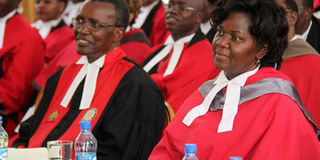Feuds over salary disparity rock the Judiciary

Justice Lydia Achode (right) with Chief Justice David Maraga after she was sworn in as the principal judge of the High Court on May 15. A petitioner wants all High Court judges paid the same entry salary. PHOTO | FILE | NATION MEDIA GROUP
What you need to know:
About 20 sitting High Court judges who left private practice to join the bench have filed a constitutional petition seeking harmonisation of entry packages
The judges blame their employer, the Judicial Service Commission, for creating the two categories on the advice of the Salaries and Remuneration Commission.
Judges who have been appointed from private practice join the bench with a basic salary of Sh532,500 per month and a non-practising allowance of Sh13,500.
Magistrates who have been promoted to become judges join the bench at a higher scale of Sh632,000 and a non-practising allowance of Sh13,500.
A salary disparity has triggered a major split among judges of the High Court, pitting those hired from private practice against those promoted from within the Judiciary.
As a result, 20 sitting High Court judges who left private practice to join the bench have filed a constitutional petition seeking harmonisation of entry packages, claiming their counterparts who rose within the judicial ranks are earning much more than they are.
The judges blame their employer, the Judicial Service Commission (JSC), for creating the two categories on the advice of the Salaries and Remuneration Commission (SRC).
Those who have been appointed from private practice join the bench with a basic salary of Sh532,500 per month and a non-practising allowance of Sh13,500.
HIGHER SCALE
Magistrates who have been promoted to become judges join the bench at a higher scale of Sh632,000 and a non-practising allowance of Sh13,500.
“JSC has illegally categorised judges as ‘those appointed from outside the Judiciary’ and ‘those appointed from within the Judiciary’ yet the Constitution does not prescribe such categorisation,” reads the petition.
A private citizen, Mr Sollo Nzuki — through lawyer Cecil Miller — filed the petition seeking to invalidate the alleged constitutional violations by the JSC, SRC and Attorney-General.
Mr Miller says the petition seeks to have all the judges treated fairly and equally since they discharge the same duties.
The petition was certified as urgent by Justice George Odunga, who directed Mr Miller to serve the JSC, SRC and the Attorney-General, who have been named as respondents in the matter. He directed the case be heard on January 21, 2019.
LOWER SALARY
Mr Nzuki avers that the JSC, on the recommendations of SRC, has continued to pay some judges of the High Court and courts of equal jurisdiction a lower salary.
The petitioner says the “outside judges” are being discriminated against by the JSC which appointed them and swore them the same day with those “from within” to carry out similar duties.
“SRC and JSC have used and applied the illegal and unconstitutional categorisation of judges complained of to determine the starting salary for each category hence entrenching disparity in remuneration thereby resulting in unfair discrimination and oppression of the affected judges,” Mr Nzuki avers.
He argues that all judges of the High Court are appointed under Article 166 (2) and 166 (5) of the Constitution and are State officers within the meaning of Article 260 of the Constitution.
The petition seeks that all judges be remunerated uniformly at the entry point.
ALLOWANCES
The SRC communicated to the JSC secretary, Ms Anne Amadi, on August 18, 2017 setting out the salaries of judges and magistrates.
The SRC capped the salary of the Chief Justice at Sh1,327,888 with an entry package of Sh990,000 minus allowances.
The starting salary for the Deputy Chief Justice was set at Sh821,833 minus allowances and a ceiling of Sh1,233,536.
The entry salary of a Supreme Court judge is Sh792,000 minus allowances, with a ceiling of Sh1,218,535.
The entry salary of Court of Appeal judges is Sh689,224 without allowances. The salary is capped at Sh1,122,759.
A High Court judge’s entry package is Sh657,426 and is capped at Sh907,279.
A chief magistrate’s entry package is Sh445,500 and capped at Sh650,253.
OFFICIAL TRANSPORT
A senior principal magistrate’s entry package is Sh334,125, which is increased to Sh480,000.
A principal magistrate starts with Sh225,000, capped at Sh360,000.
A senior resident magistrate has an entry salary of Sh180,000 which rises over time to Sh300,000. And a resident magistrate joins the Judiciary at a salary of Sh123,750 and earns a maximum of Sh190,000.
In that circular, the SRC advised JSC that a judge or a magistrate who attains the maximum shall retain search remuneration unless reviewed by SRC. Other benefits include official transport for the CJ, DCJ and judges.
MEDICAL COVER
They also enjoy a medical cover for self, spouse, children below age of 25, fully dependent on the judge or magistrate.
The CJ, DCJ and judges enjoy a medical cover of Sh10 million for inpatient and Sh300,000 for outpatient; maternity Sh150,000; dental Sh75,000; and optical Sh75,000. Magistrates enjoy a medical cover of Sh4 million (inpatient), Sh250,000 outpatient; maternity Sh150,000; dental Sh75,000; and optical Sh75,000.
They also enjoy group life insurance, car loans and mortgage facilities. Magistrates earn a non-practising allowance of Sh10,000 a month.




